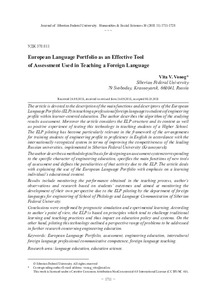European Language Portfolio as an Effective Tool of Assessment Used in Teaching a Foreign Language
Скачать файл:
URI (для ссылок/цитирований):
https://elib.sfu-kras.ru/handle/2311/99016Автор:
Vonog, Vita V.
Воног, В.В.
Дата:
2018-10Журнал:
Журнал Сибирского федерального университета. Гуманитарные науки. Journal of Siberian Federal University. Humanities & Social Sciences;2018 11 (10)Аннотация:
The article is devoted to the description of the main functions and descriptors of the European Language Portfolio (ELP) in teaching a professional foreign language to students of engineering profile within learner-centred education. The author describes the algorithm of the studying results assessment. Moreover the article considers the ELP structure and its content as well as positive experience of testing this technology in teaching students of a Higher School. The ELP piloting has become particularly relevant in the framework of the arrangements for training students of engineering profile to proficiency in English in accordance with the internationally recognized system in terms of improving the competitiveness of the leading Russian universities, implemented in Siberian Federal University (Krasnoyarsk).
The author describes a methodological basis for designing an assessment system corresponding to the specific character of engineering education, specifies the main functions of new tools of assessment and defines the peculiarities of that activity due to the ELP. The article deals with explaining the use of the European Language Portfolio with emphasis on a learning individual’s educational content.
Results include monitoring the performance obtained in the teaching process, author’s observations and research based on students’ outcomes and aimed at monitoring the development of their own perspective due to the ELP piloting by the department of foreign languages for engineering of School of Philology and Language Communication of Siberian Federal University.
Conclusions were confirmed by prognostic simulation and experimental learning. According to author’s point of view, the ELP is based on principles which tend to challenge traditional learning and teaching practices and thus impact on education policy and systems. On the other hand, piloting this technology outlined a perspective range of problems to be addressed in further research concerning engineering education Статья посвящена рассмотрению основных функций и дистрипторов Европейского
языкового портфеля (ЕЯП) при обучении профессиональному иностранному языку
студентов инженерных специальностей в рамках личностно-ориентированного обучения. Приводится организация контроля результатов усвоения знаний обучающихся.
Дается описание структуры ЕЯП и его содержания, обсуждается положительный
опыт апробации этой технологии в обучении студентов высших учебных заведений.
Использование EЯП в качестве инновационного подхода стало особенно актуальным в рамках мероприятий по языковой подготовке студентов инженерных специальностей в соответствии с международной признанной системой повышения конкурентоспособности ведущих российских университетов, реализующейся в Сибирском федеральном университете (Красноярск).
Автор описывает методологическую основу для разработки системы оценки,
соответствующей специфике инженерного образования, указывает основные функции
оценки в новом формате и определяет особенности этой деятельности в рамках
ЕЯП. В статье рассматривается аргументирование использования Европейского
языкового портфеля с акцентом на образовательный продукт обучающегося.
Результаты исследования включают в себя мониторинг достижений, полученных в
процессе обучения, авторских наблюдений и исследований, основанных на результатах
учащихся и направленных на осуществление контроля развития их языковой личности
благодаря апробации экспериментальной части языкового портфеля кафедрой
иностранных языков для инженерных направлений Института филологии и языковой
коммуникации Сибирского федерального университета.
Выводы были подтверждены прогностическим моделированием и экспериментальным
обучением. Согласно авторской точке зрения, ЕЯП основывается на принципах,
которые бросают вызов традиционной практике обучения и преподавания и,
таким образом, влияют на политику и систему образования. С другой стороны,
апробация языкового портфеля определила перспективный круг вопросов, требующих
дальнейшего исследования в рамках инженерного образования
Коллекции:
Метаданные:
Показать полную информациюСвязанные материалы
Показаны похожие ресурсы по названию, автору или тематике.
-
The Use of Multimedia Technologies in Teaching Russian as a Foreign Language: a Film-Viewing Study
Mikeshova, Ekaterina A.; Микешова, Е.А. (Сибирский федеральный университет. Siberian Federal University, 2017-03)The article discusses the use of multimedia technologies in teaching Russian as a foreign language considering film-viewing as an example. Multimedia technologies change the character of educational activities by increasing ... -
Being an Ethical Speaker Online: Correspondence with Foreign Partners
Osetrova, Elena V.; Осетрова, Е.В. (Сибирский федеральный университет. Siberian Federal University, 2015-11)Analysis of the rules of language behavior in social network “VKontakte” is represented in the paper. 14 rules in total constitute the unwritten code (the term of T.V. Shmeleva): “Do not tell what is unpleasant for the ... -
Commodification of Foreign Languages in the Educational Space of Modern Russia
Razumovskaya, Veronica A.; Разумовская, В.А. (Сибирский федеральный университет. Siberian Federal University, 2015-11)The main purpose of the article is to show in diachronic and synchronic aspects foreign languages teaching and learning within the educational space of Russia. A special attention is paid to English as a foreign language ... -
The Approaches to Philological Competence as an Integral Part of Professional Competence of a Foreign Language Teacher
Komiakova, Irina M.; Комякова, И.М. (Сибирский федеральный университет. Siberian Federal University., 2016-01)The article is devoted to the issues of the philological competence and the importance of developing it in the process of training Bachelors of Education (Major in Foreign Languages) at high school. First of all, it ... -
Changes and Challenges of Modern Society: what it Takes to Reach a Near-Native Level of Foreign Language Proficiency
Grishaeva, Elena B.; Гришаева, Е.Б. (Сибирский федеральный университет. Siberian Federal University., 2015-11)The article presents a controversial nature of undergoing radical changes in the sphere of teaching / learning foreign languages at the University level. Modernization of higher education in Russia requires critical ...

